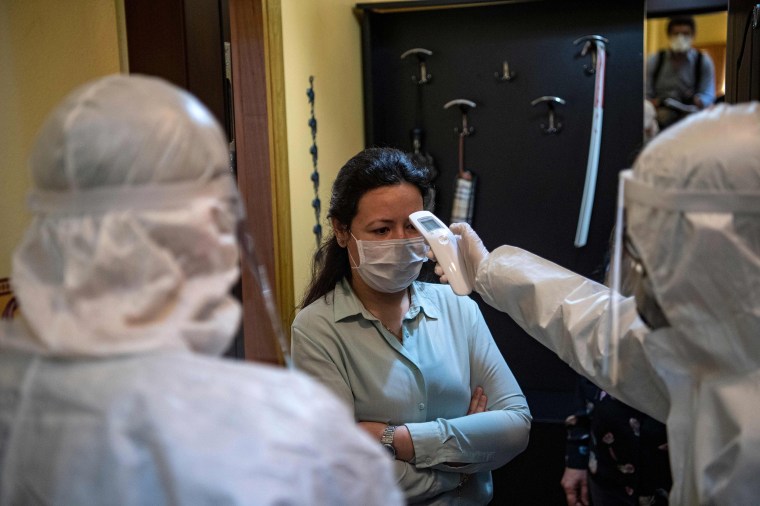As states across America try to reopen cities and towns, some people are acting like we have two mutually exclusive options: protect our public health or get our economy up and running. They could not be more wrong. Workers, consumers and businesses need to feel safe in their communities before we can get back to normal. In other words, we can’t rebuild our economy without stopping the spread of COVID-19.
Some people are acting like we have two mutually exclusive options: protect our public health or get our economy up and running. They could not be more wrong.
Even as we rush to develop a vaccine — which could take months, if not years — contact tracing can help halt the spread of the virus now. With this in mind, we have put forward a proposal for a federal contact tracing program that we want included in the next relief package that passes Congress. The House Democrats’ proposal already includes pieces of it, including $500 million to hire a diverse group of culturally competent contact tracers. But we need to stand up our whole plan for a national contact tracing strategy.
Today, we will be introducing legislation to do just that. Our bill will massively expand our health care workforce, make sure states and localities have the support they need, and provide robust privacy protections to ensure Americans’ personal data and health information are protected.
According to Johns Hopkins University researchers, on average,one person who has COVID-19 can infect two to three other people. If those three each go on to infect three more people, the first person in the chain — our “patient zero” — will have led to 12 cases. And if that scenario plays out just 10 times,the first case will have led to more than 59,000. But if patient zero was isolated, and all the people they’d interacted with — including the three they personally infected — also didn’t interact with anyone else, the chain of infection would come to a grinding halt. This is what we need to happen for every single case of COVID-19. And to do it, we need contact tracers.
Here’s how contact tracing works: A contact tracer learns from patient zero all the people they’ve interacted with and might have infected. If, for instance, patient zero went to the grocery store, the contact tracer gets in touch with people at the store, alerts them to the exposure, explains what to do next, and later follows up with patient zero and the people exposed.
We know from other countries and our own past successes mitigating the spread of diseases like tuberculosis that without contact tracing, we won’t defeat COVID-19. It has been a key element of the responses inGermany,Icelandand South Korea. U.S. states are racing to conduct contact tracing, too. Michigan will start rapidly boosting its contact tracing, and Massachusetts has developed a robust program with Partners in Health.
But here’s the problem.There are only 2,200 contact tracers in the entire United States right now, which has 330 million people. As many as 50,000 public healthjobs have been lost since the Great Recession, and public health departments simply don’t have the resources to hire the people they need.
The Trump administration’s slow and dysfunctional response has been a disaster of epic proportions. That’s why Congress must step in, and that’s why we have proposed the Coronavirus Containment Corps. Our plan requires the Centers for Disease Control and Prevention to outline a nationwide contact tracing strategy and provide funding that will enable state, local, territorial and tribal health agencies to staff up and perform this essential work — fast.
The Trump administration’s slow and dysfunctional response has been a disaster of epic proportions. That’s why Congress must step in.
While we work to boost testing capacity and to ramp up the production of medical supplies, we must also rapidly expand our public health workforce to augment public health authorities’ capacity to investigate cases of COVID-19 and identify disease-positive individuals’ contacts; trace those contacts; and provide support to ensure those contacts can safely quarantine and break the chain of infection.
Building the Coronavirus Containment Corps is more than a health imperative: it’s a plan to put Americans back to work. Our proposal would require the CDC and the Indian Health Service to provide funds to state, local, tribal and territorial health departments to hire, train and deploy case investigators, contact tracers and social support specialists with their input and coordinate with state, local, territorial and tribal workforce agencies to connect unemployed individuals with contact tracing employment opportunities and long-term employment after the pandemic.
But this isn’t just a plan to employ Americans to do contact tracing. It is a plan to execute the steps that are essential to stopping the virus dead in its tracks, keeping our communities safe and restarting the American economy. We cannot hope to defeat a virus that so easily jumps state lines without a national contact tracing plan.
The name “Coronavirus Containment Corps,” or CCC, echoes President Franklin Roosevelt’s own CCC, the Civilian Conservation Corps, which put hundreds of thousands of Americans back to work during the Great Depression. As we face a crisis unlike any in our lifetimes, we must use the same imagination that lifted our country nearly a century ago, and fight for the safety of our loved ones, our communities and our collective future.

